
Samples from the publication:


|
|
2022 Public Perception Survey: Plastic Pollution. Virginia's Voters Support Action
September 2022. 8 pages. Free download.
May 2023. 285 pages! Free Download.
Virginia voters are concerned about plastic getting into our rivers, bays and ocean, and they support action to decrease littered plastic bags, bottles, cups, food containers and other plastic items according to a new statewide survey by the Virginia Coastal Zone Management Program (CZM), Clean Virginia Waterways of Longwood University (CVW), and OpinionWorks.
The survey explored the perceptions and attitudes of Virginia’s voters about several problems, and measured voters’ support for policies that have been adopted in other states:
• Deposits on beverage bottles and cans
• Requirements to decrease plastic packaging
• Shifting the costs of recycling from taxpayers to the producers of the plastic waste
• Laws to reduce the use of polystyrene, plastic bags, and other commonly littered items.
This survey reveals that Virginia voters are deeply concerned about plastic pollution, and are ready to support policies to decrease plastic pollution, especially the plastic that ends up in the ocean. Data from this survey will assist in crafting successful behavior change campaigns as well as public policies.
OpinionWorks, in partnership with CZM and CVW, conducted a representative statewide sampling of 901 Virginia registered voters March 8-13, 2022. This survey sample has a potential error margin of ±3.3 at the 95% confidence level. Voters were interviewed online and on wireless and landline telephones. This survey represented all areas of the Commonwealth and matched the profile of the registered voter population including gender, race and ethnicity, and age. The survey respondents were equally represented by political affiliation-- Republican, Democrat and independent. As a follow-up, the researchers invited a cross-section of voters into deeper, one-on-one interviews to better understand their attitudes and reasoning around these issues. |
| |
|
|
Data from Litter Cleanups: Leading to Solutions. A CVW Marine Litter Report.
Sept 2022. 4 pages. Free download.
There are many questions about where litter
comes from, how it travels through watersheds,
and where it ends up. Data can help
us understand what the most abundant sources
of litter are in your local community, in Virginia,
in the United States, and in the entire world. With data, we can prioritize prevention strategies and shape future actions.
Read about WHY and HOW we collect data during our statewide cleanup events, and how you can contribute! |
|
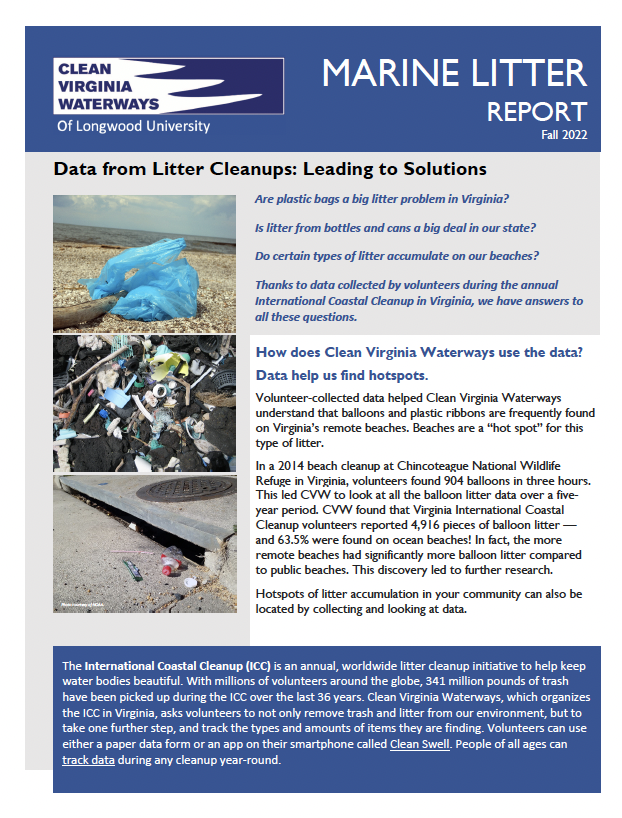
|
| . |
|
|
2021-2025 Virginia Marine Debris Reduction Plan
November 2021. 37 pages. Free download.
This updated Virginia Marine Debris Reduction Plan (VMDRP) for 2021-2025 is a roadmap, planning and monitoring tool, and a common framework for collaboration that will lead us to cleaner and healthier coastal waters and oceans.
Plastic pollution and marine debris are of local, regional, national, and global concern, so the Virginia Coastal Zone Management (CZM) Program took a leadership role in creating the first VMDRP in 2014–making Virginia the first state on the east coast to have a Plan in place to reduce marine debris and only the second in the US. Now, this updated Plan further strategically addresses this problem through policies, laws, research, behavior-change, and action on all levels. It establishes a comprehensive framework for strategic action and identifies priorities to reduce the impacts of marine debris on Virginia’s coasts, people, and wildlife.
. |
|
 i i
|
Virginia Abandoned & Derelict Vessel Work Group Full Report.
June 2022. 44 pages. Free download
Covers research from 2021-2022 and recommendations to address abandoned and derelict vessels (ADVs) in Virginia’s waterways. The report summarizes the discussions of the Virginia ADV Work Group comprised of federal, state and industry representatives. The report has been reviewed and approved by state natural resource agency leadership. |
|
 |
Virginia Abandoned & Derelict Vessel Work Group SUMMARY Report
June 2022. 4 pages. Free download.
This document includes a summary of the issues surrounding ADVs, and the recommendations from the Virginia ADV Work Group. |
|
 |
Abandoned and Derelict Vessels in the Commonwealth: How to Improve Virginia’s ADV Program
MAY 2022. 27 pages. Free download
This Policy Paper by the Virginia Coastal Policy Center at William & Mary explores the current laws in Virginia as well as other states' efforts to prevent and remove abandoned boats.
|
|
 |
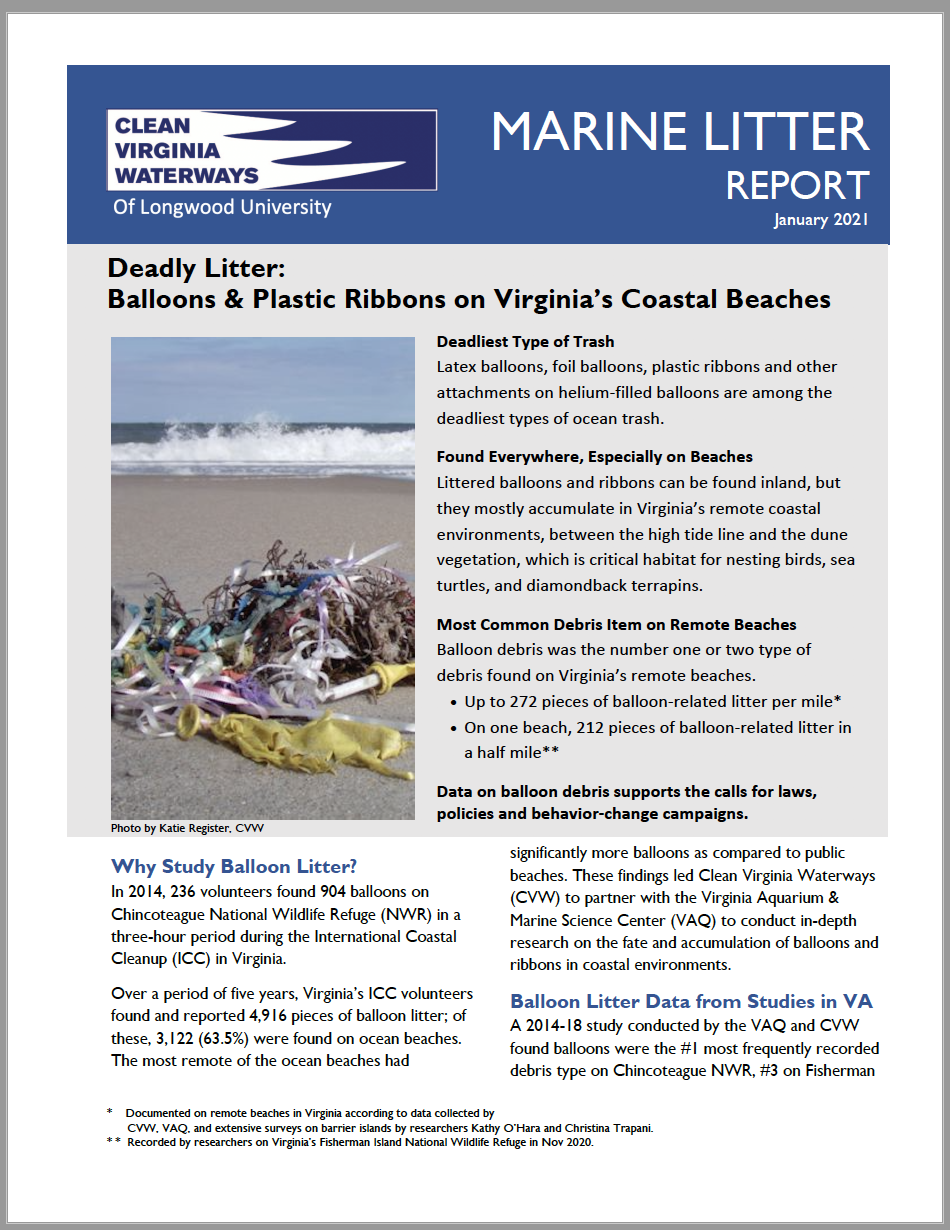 |
|
Balloons and Plastic Ribbons: Deadly Litter on Virginia's Remote Beaches
January 2021. 4 pages. Free download
Latex balloons, foil balloons and plastic ribbons are deadly forms of litter, and they are a top source of debris found on Virginia’s remote beaches according to this new report by Clean Virginia Waterways of Longwood University. Litter was surveyed on Virginia’s barrier islands, Fisherman Island National Wildlife Refuge, Back Bay National Wildlife Refuge, and other beaches between 2013 and 2020 revealing that balloon-related litter items are often the #1 most frequently found type of debris.
Research cited in the report was done in conjunction with behavior research and a social marketing campaign in Virginia to understand and reduce the intentional releases of balloons during memorial and celebratory events. The campaign was created by the Virginia Coastal Zone Management Program, Clean Virginia Waterways, NOAA Coastal Management, and NOAA Marine Debris Program. This campaign has inspired an expanded campaign effort in the Mid-Atlantic also referenced in the report. |
| |
|
|
 |
|
REPORT: Littered Bottles & Cans: Higher in Virginia Than in States with Bottle Bills.
November 2020. Free download
Plastic bottles, glass bottles, and aluminum cans are approximately two and half times more frequently littered in Virginia (a state without a bottle bill) than in states with bottle bills according to this new report by Clean Virginia Waterways of Longwood University. We compared litter data from states with bottle bills to states without bottle bills. In Virginia, bottles and cans accounted for nearly 22 percent of all litter recorded by volunteers in 2019. But in states with container deposit bills, bottles and cans accounted for less than 9 percent, on average, of the total debris recorded during the 2019 International Coastal Cleanup.
|
| |
|
|
 |
|
Monitoring Marine Debris in Virginia's Coastal Zone.
Project Report: April 2014 through June 2018
April 2019. Free Download.
Researchers from the Virginia Aquarium & Marine Science Center teamed up with Clean Virginia Waterways to conduct monthly monitoring of marine debris on four coastal beaches in Virginia in 2014-2018. This report documents the 15,276 pieces of debris that were found--the vast majority of which (83.0%) were made of plastic.
This project was funded by the VA Coastal Zone Management Program at the VA Department of Environmental Quality through two grants which were funded by the National Oceanic and Atmospheric Administration. A report from the Virginia Aquarium & Marine Science Center to the Virginia Coastal Zone Management Program by Katie Register, Christina Trapani and Mark Swingle. |
| |
|
|
|
The following two reports summarize an extensive, long-term research project focused on balloon-related litter, its impacts and solutions: |
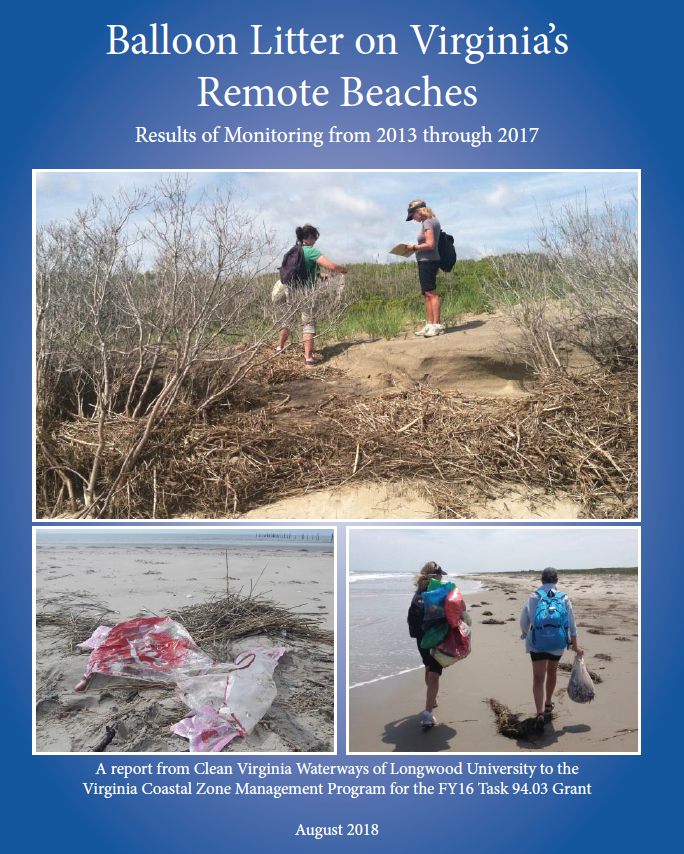
Balloon Litter on Virginia's Remote Beaches
2018. More than 11,400 balloons, balloon pieces and attachments were found on Virginia’s most remote beaches by Clean VA Waterways' researchers as part of a five-year study of balloon litter in coastal environments of Virginia. Balloon litter was the #1 most frequently found type of marine debris on these beaches.
A report from Clean Virginia Waterways of Longwood University to the Virginia Coastal Zone Management Program by Christina Trapani, Kathy O'Hara and Katie Register. |
|
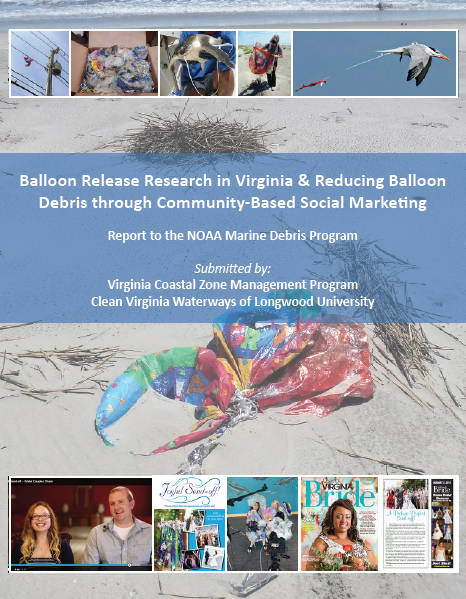
Balloon Release Research in Virginia & Reducing Balloon Debris through Community-Based Social Marketing.
2017. Summarizes 3 years of research on WHO plans balloon releases, WHY they do it, and ALTERNATIVES that are litter-free. Final report to the NOAA Marine Debris Program from the VA Coastal Zone Management Program and Clean Virginia Waterways. 117 pages.
A report from the Virginia Coastal Zone Management Program and Clean Virginia Waterways of Longwood University to NOAA Marine Debris Program by Virginia Witmer, Katie Register and Laura McKay.
|
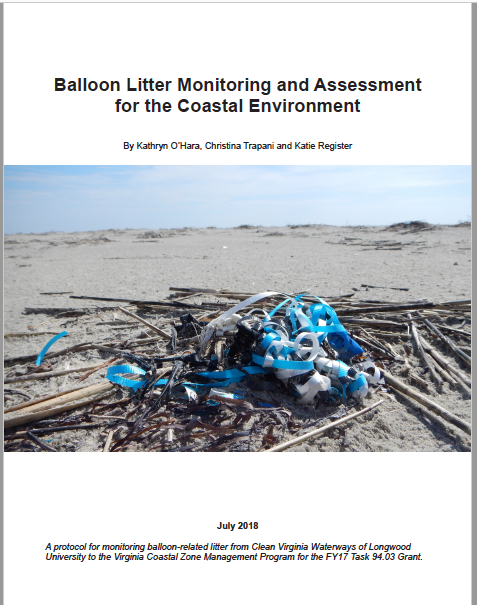
Balloon Litter Monitoring and Assessment for the Coastal Environment: A Protocol. July 2018. This detailed protocol outlines how to collect data about balloon litter on beaches.
A report from Clean Virginia Waterways of Longwood University to the Virginia Coastal Zone Management Program by Kathy O'Hara, Christina Trapani and Katie Register. |
|

Beachy Clean: 2017 Progress Report. December 2017. This is a summary of the Beachy Clean community education campaign that targets beach visitors with litter-prevention messages. 23 pages.
A report from Clean Virginia Waterways of Longwood University to Keep America Beautiful by Katie Register and Christina Trapani. |
| |
|
|

Reaching Beach Visitors: A Unique Cigarette Litter Prevention Program. May 2017. Clean Virginia Waterways developed a cigarette litter prevention campaign that focused on beach visitors. This report covers our work and our findings.
A report from Clean Virginia Waterways of Longwood University to Keep America Beautiful by Katie Register and Christina Trapani. |
|

Monitoring Marine Debris in Virginia's Coastal Zone: Project Report. 2016. For 30 months, the Virginia Aquarium & CVW monitored four coastal beaches. This report shows the data collected, including the fact that more that 80% of debris items were made of plastic.
A report from the Virginia Aquarium & Marine Science Center to the Virginia Coastal Zone Management Program by Katie Register, Christina Trapani and Mark Swingle.
|
| |
|
|

Virginia Marine Debris Reduction Plan: Summary and Look Forward. 2016. This is a summary of the key goals of the Virginia Marine Debris Reduction Plan. 20 pages.
|
|

2nd Virginia Marine Debris Summit: Report. 2016. This document captures the ideas and highlights of the 2nd Virginia Marine Debris Summit. 155 pages. |

Virginia Marine Debris Emergency Response Guide. Updated April 2022. Occasionally, large amounts of debris enter nearshore coastal waterways during natural disasters. This debris can be a hazard to navigation, damage habitat, and pose pollution threats. Download this Guide from NOAA to learn more. |
|

Developing a Marine Debris Reduction Plan for Virginia. 2014. This document explains the steps that the VA Marine Debris Leadership Team took (research, surveys, interviews, setting priorities, etc.) as it developed this statewide plan. Virginia is the first state on the East Coast with a plan in place. 112 pages. |








